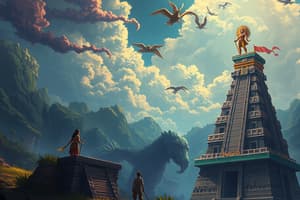Podcast
Questions and Answers
Who was Louis XVI?
Who was Louis XVI?
Louis XVI was the last king of France (1774-92) in the line of Bourbon monarchs preceding the French Revolution of 1789.
What is Joseph-Napoléon Bonaparte known for?
What is Joseph-Napoléon Bonaparte known for?
He was the older brother of Napoleon I, who made him King of Spain from 1808 to 1813.
What role did Otto von Bismarck play in German history?
What role did Otto von Bismarck play in German history?
He was a German statesman who unified numerous German states into a powerful German Empire under Prussian leadership.
What is Karl Marx best known for?
What is Karl Marx best known for?
What major theory is Charles Darwin known for?
What major theory is Charles Darwin known for?
Who was Toussaint Louverture?
Who was Toussaint Louverture?
What is Simón Bolívar known for?
What is Simón Bolívar known for?
What did José de San Martín accomplish?
What did José de San Martín accomplish?
What was Selim III's contribution to the Ottoman Empire?
What was Selim III's contribution to the Ottoman Empire?
Who was Muhammad Ali in Egyptian history?
Who was Muhammad Ali in Egyptian history?
What was Cixi's role in China?
What was Cixi's role in China?
Who were the Bolsheviks?
Who were the Bolsheviks?
What is Menelik II known for?
What is Menelik II known for?
What is Theodore Roosevelt recognized for?
What is Theodore Roosevelt recognized for?
What did Porfirio Díaz achieve in Mexico?
What did Porfirio Díaz achieve in Mexico?
What is George Washington known for?
What is George Washington known for?
What was the American Revolution?
What was the American Revolution?
What was the Population Revolution?
What was the Population Revolution?
What triggered the French Revolution?
What triggered the French Revolution?
What was the Brazilian Revolution?
What was the Brazilian Revolution?
Who led the Haitian Revolution?
Who led the Haitian Revolution?
Flashcards are hidden until you start studying
Study Notes
Key Historical Figures
- Louis XVI: Last Bourbon king of France (1774-1792), executed during the French Revolution.
- Napoleon Bonaparte: French military leader who became Emperor; notable for his reforms and expansion across Europe.
- Otto von Bismarck: German statesman who unified Germany and maintained peace in Europe from 1871 to 1914 through a balance of power.
- Karl Marx: Philosopher and economist; co-authored The Communist Manifesto, a foundational text for socialism.
- Charles Darwin: Naturalist known for the theory of evolution, which explains biological change over time.
Independence Movements
- Toussaint Louverture: Leader of the Haitian independence movement during the French Revolution, instrumental in ending slavery on the island.
- Simón Bolívar: Venezuelan military leader; played a key role in Latin American independence from Spanish rule.
- José de San Martín: Argentine general and leader of the southern campaign for independence in South America.
Reforms and Leadership
- Selim III: Ottoman Sultan (1789-1807) focused on modernization; deposed by the Janissaries.
- Muhammad Ali: Albanian soldier who became viceroy of Egypt; modernized Egypt and established it as a powerful state by removing Ottoman control.
- Cixi: Influential Empress Dowager of the Qing dynasty in China, ruled during a period of turmoil in the late 19th century.
Revolutionary Groups
- Bolsheviks: Radical faction of Russian Social Democrats led by Lenin; overthrew the provisional government during the Russian Revolution.
Conflicts and Victories
- Menelik II: Emperor of Ethiopia; successfully defended against Italian invasion at the Battle of Adowa, ensuring Ethiopian independence.
- Theodore Roosevelt: 26th President of the U.S.; led the country during the Spanish-American War; facilitated the construction of the Panama Canal.
Notable Leaders in America
- Porfirio Díaz: President of Mexico; known for establishing a centralized state, leading to economic modernization.
- George Washington: 1st President of the U.S. and commander-in-chief during the American Revolution; key figure in gaining independence.
Major Historical Events
- American Revolution: Conflict in which the 13 colonies gained independence from Britain (1775-1783) due to taxes and other grievances, culminating in the Treaty of Paris.
- Population Revolution: Significant population growth in Western Europe around 1730; set the stage for the Industrial Revolution.
- French Revolution: Began in 1789, overthrew the monarchy and established republicanism, ultimately leading to Napoleon's rise to power.
- Brazilian Revolution: Bloodless independence movement in 1822; a petition led to Brazil's independence from Portugal without bloodshed.
- Haitian Revolution: Successful uprising led by Toussaint Louverture against French colonial rule, resulting in Haiti becoming the first independent black-led nation in 1804.
Studying That Suits You
Use AI to generate personalized quizzes and flashcards to suit your learning preferences.




